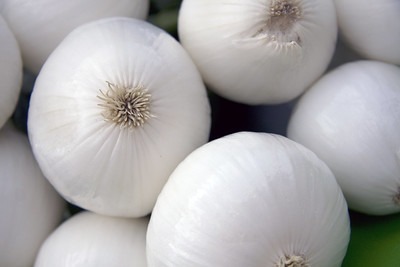
GM/Biotech Crops Report – September 2023
5th September 2023- GM/Biotech Crops Monthly Reports (BELOW) form part of BCPC’s free three-tier Biotech Crops Info service.
- This service also includes a weekly round-up of news from around the globe – see BCPC Newslink GM Crops section.
- Plus – Free access database on over 300 GM/biotech products covering 23 crops in the global market visit BCPC’s GM/Biotech Crops Manual – Register here for free access.
- Already registered? Click here
GM/Biotech Crops Monthly Report September 2023
Whiter onions for what?
 Collaboration between Iowa State University and the Onion and Garlic research institute in India has achieved the first CRISPR editing of the onion genome to produce onions that do not have that green veining in the bulb. Since the greening disappears when the onion is cooked, the benefit of this achievement is not clear. Pic: ayngelina
Collaboration between Iowa State University and the Onion and Garlic research institute in India has achieved the first CRISPR editing of the onion genome to produce onions that do not have that green veining in the bulb. Since the greening disappears when the onion is cooked, the benefit of this achievement is not clear. Pic: ayngelina
Novel malaria cure
Researchers in Spain had a problem with one batch of mosquitoes in their experiments which failed to develop the malaria parasite in their blood. Eventual further investigations found that they were infected with a bacterium that inhibited the development of the malaria parasite and they have identified the active ingredient which can stop malaria infections without killing the mosquitoes.
Are the old ways better?
India is a major producer of rice for the world but poor harvests have caused them to limit exports so that they can feed themselves. Many growers have adopted hybrid varieties in search of better yields but these varieties are more demanding to grow and some growers are switching back to red rice which is hardy, can be grown organically and currently fetches a better price at market.
Full Story.
GM maize in Indonesia
Bayer have launched their glyphosate-tolerant GM maize variety Dekalb DK95R in Indonesia, claiming that it offers up to 30% extra yield over conventional varieties according to their trials the previous year. This variety has not yet been added to the Biotech Crops database because the necessary background information such as the genes added and the method used are not yet published.
No sugar fruit juice
A Biotech company in Bangkok has used microbe fermentation to produce reduced sugar apple juice and orange juice that will be commercially available in Singapore at the end of 2023.
In-vivo gene editing
Pennsylvania State University and Philadelphia Children’s hospital have used nanoparticles to deliver mRNA in to cells in the blood of live subjects and achieved correction of some blood disorders such as sickle cell anaemia without pre-conditioning the cells. This offers hope of treatments for a number of other immune-deficiencies as well as potentially reducing the cost of gene editing.
Better not bitter soybeans
Soybeans used in food manufacture can lead to a bitter taste because of the soyasaponin content but now researchers in China have identified the genes responsible for their production and used CRISPR editing to disrupt the genes, removing the bitter taste and incidentally improving germination of the seed.
GABA-fortified rice
GABA (gamma amino-butyric acid) is essential for many biological processes and can be used as a supplement to reduce stress and anxiety issues. Now a team in Japan has used CRISPR editing to trim one of the genes in rice to enhance the production of this amino acid. This enhancement also benefits the rice which becomes more tolerant of stress conditions such as drought and high salinity in the soil.
Better maize plants
Researchers in China have used gene-editing to suppress gibberellin production in maize which has resulted in a semi-dwarf growth habit which is more tolerant of drought and shows almost no reduction in yield.
Reduced cadmium in rice
Cadmium in the diet increases the risk of cancer and rice plants have a gene that enables the plant to take up cadmium from the soil. Knocking out this gene adversely affect the growth of the rice plant but now researchers at the Chinese Academy of Sciences have found a way of reducing the efficacy of this gene by selectively editing one region of the gene, producing rice that takes up less cadmium as it grows.
GM maize in Holland
The Dutch Commission for genetic Modification has evaluated a cotton variety with stacked genetic modifications (GHB614 x T304-40 x GHB119 x COT102 which has Lepidopteran insect resistance and tolerance of glufosinate and glyphosate) and has conclude that it poses negligible risk to the environment. It can therefore be imported and processed but still cannot be grown there even if climatic conditions were suitable.
Hairy roots help citrus plants
Citrus and a number of other fruits are often infected with bacteria that cause greening and multiplying up resistant varieties is a slow process. Now some researchers at Texas A & M Agrilife have used hairy roots from citrus plants to cultivate the bacteria and have used these living vessels to screen for antimicrobial peptides.
Herbicide-tolerant Camelina
Camelina is intended to be grown as a feedstock for the biofuel market and Yield10 BioScience Inc. have developed a variety with tolerance of Group 2 herbicides (sulfonyl ureas and imazidolinones). Initial results from foliar applications are good and the next step is to take the plots to yield. Perhaps Rothamsted can breed this tolerance in to their Omega-3 rich variety.
Super potato
Researchers at McGill University have developed a pan-genome of potatoes from over 300 varieties of potato and near relatives and plan to use this knowledge to develop potatoes with improved nutritional value, better disease resistance and greater tolerance of adverse weather conditions.
Bacterial blight resistance in cotton
Researchers at Oklahoma University and the International Rice Research Institute have discovered a gene (B5) that offers improved resistance to bacterial blight in cotton by increasing the production of natural phytoalexins in the plants.
Wheat grown after maize
Growing wheat and maize in the same rotation is known to increase the risk of Microdochium and Fusarium ear blight in the wheat grains but now it seems that there might also be a benefit. The University of Bern has shown that specialised root exudates from the maize (benzoxazinoids) can affect the soil microbiome and lead to a 4% increase in wheat yields where this occurs. Work is underway to identify where this yield benefit occurs.
THE LATEST ADDITIONS TO THE GM/BIOTECH DATABASE ARE:
- There are no additions to the database this month
FOR INSTANT ACCESS TO GM BIOTECH MANUAL CLICK HERE (Registration required)
Already Registered? Click here to access

